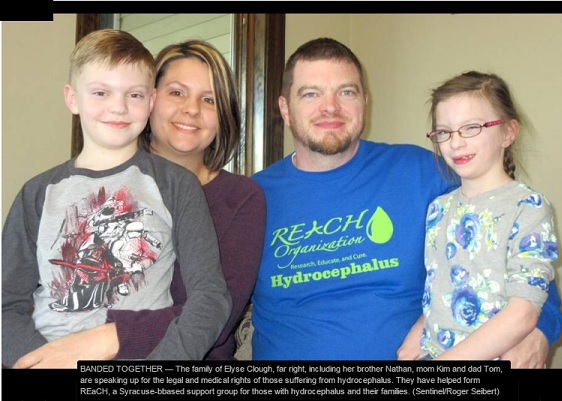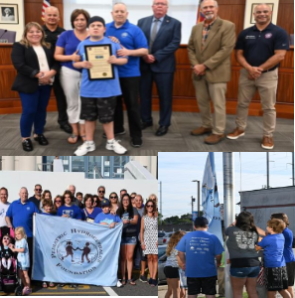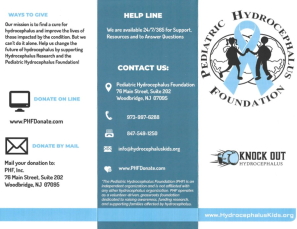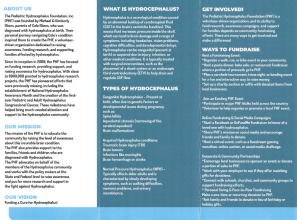PHF In The News: Vernon girl gives courage a new face
March 7, 2016 by PHF Filed under Uncategorized

TOWN OF VERNON — The battle against the brain condition hydrocephalus has found a champion in six-year-old Westmoreland elementary school student Elyse Clough.
Like her namesake (Clough is based on an old Irish word, an Chloch, which means ‘the stone’), Elyse has been a rock for her family through her efforts to live a full life despite her disability.
Her bravery, and her parents’ commitment to help her and others overcome legal and medical barriers to fighting the condition, have led to her being named National Ambassador of Hydrocephalus Awareness for 2016 by the Pediatric Hydrocephalus Foundation (PHF).
“We had formed the group, REaCH, (Research, Educate, and Cure Hydrocephalus) to provide support for those suffering from hydrocephalus and their families and had been in contact with PHF,” Elyse’s mother, Kim, said. “They knew about us and thought Elyse was a good match.”
Later this year Elyse will make a number of appearances on social media and will speak before the U.S. Congress and House of Representatives in Washington, DC on August 19.
Elyse will join her parents and 23 other members of REaCH. Her counterpart, Tyler Side, 11, of Washington State, whom PHF has chosen to represent boys battling hydrocephalus, will join her there. They will stand before the country’s legislative branch to help advocate for continued education and research for her condition.
“It’s been a big deal to her to be chosen,” Kim Clough said.
Her work will continue into September, which PHF has designated as National hydrocephalus Awareness Month for the eighth year.
PHF, which has chapters in 30 states, provides supports to families and also advocates with the medical and legal communities to help find a cure. Since 2010 they have awarded $375,000 in grants and donations towards research and education on the condition.
Hydrocephalus (a combination of the Greek words hydro, or ‘water,’ and kephalos, or ‘head’) is a condition in which an abnormal amount of cerebrospinal fluid accumulates in the brain’s ventricles. The excess fluid causes swelling on the brain.
The ventricles are inter-connected spaces in the brain that produce cerebrospinal fluid; the fluid cushions the brain, helps prevent infection and eases blood flow in the brain.
“The problem is that the fluid will not drain, and there is increased swelling in the brain and other issues,” Elyse’s father, Tom, said.
Hydrocephalus has over 180 different causes. They include birth defects, traumatic brain injury, infection, and overproduction or under absorption of brain fluid. Elyse’s began when she was born premature, at 24 weeks.
“She can be fine one minute and then start having a seizure, and she’s in an ambulance,” Kim Clough said. “Life can change in a minute.”
Along with the risk of seizure, Elyse takes medication for her underdeveloped lungs (caused by her premature birth) and undergoes physical therapy, occupational therapy and speech therapy. She has trouble feeding herself anything besides finger foods. And she’s endured six shunt operations.
Hydrocephalus has no known cure, and the only universally reliable treatment is a shunt implant. (Endoscopic third ventriculostomy, a shunt-free procedure where an incision at the bottom of enlarged ventricles allows fluid to drain only works in two-thirds of patients). A shunt is a soft silicone implant placed in the ventricle, then tunneled under the skin to the abdomen where excess fluid is drained and re-absorbed into the body.
The relief provided by shunts is compromised by their frequent failure rate. Children have a shunt failure rate between 25 and 40 percent. Replacing a shunt is a complicated and potentially dangerous process.
“Every time Elyse, or anyone, has a shunt replaced they require a battery of tests,” Tom Clough said. “They include a CTE scan and several x-rays. Elyse is forced to absorb more radiation than she should have to.”
CTE stands for chronic traumatic encephalopathy, the brain condition recently brought into national attention because of its prevalence among former professional football players.
Elyse is also beginning to deal with the emotional impact of her condition.
“She is becoming more aware of what is happening with her, and she gets nervous sometimes,” Tom Clough said.
Elyse’s state of mind is helped by the presence of her eight-year-old brother, Nathan, who proudly wears a PHF pin on his backpack.
“I’m a sound sleeper, and I missed the ambulance the last time Elyse had a shunt put in (on Feb. 10),” he said. “I stayed with my grandmother the next day, and after I went to school I kept wanting to leave school and check on my sister.”
Nathan’s constant interaction with Elyse has helped her improve her daily living skills.
“She’s very reliant on her brother,” Kim Clough said.
Kim and Tom have joined Elyse in her fight. They formed REaCH in 2010; Kim serves as president and Tom is the group’s treasurer. The group meets once a month at the library in the town of DeWitt near Syracuse.
“It’s important to have the support of those enduring the same challenges that you’re going through,” Kim Clough said.
The Cloughs’ burden is eased by their flexible work schedule. Kim is part-owner of Colonial Pharmacy in Whitestown, where Tom works as an accountant.
“We are able to work around her needs, which is good because she always needs someone with her,” Kim Clough said. “She always comes first.”
Those suffering from hydrocephalus and their families may take solace that the condition, like juvenile diabetes, is not necessarily fatal if properly treated.
“We have all sorts of people of all ages at our meetings,” Kim Clough said. “They won’t let hydrocephalus stop them from living their lives.”
Count Elyse among them. Despite her pain she is planning on living a fulfilling life.
“They asked me in school what I wanted to be when I grow up, and I told them I wanted to be a pediatrician,” she said.
 Read more at: https://html.com/attributes/img-width/>
Read more at: https://html.com/attributes/img-width/>



























